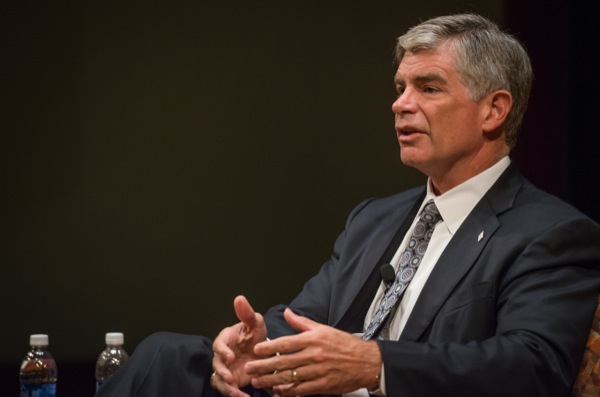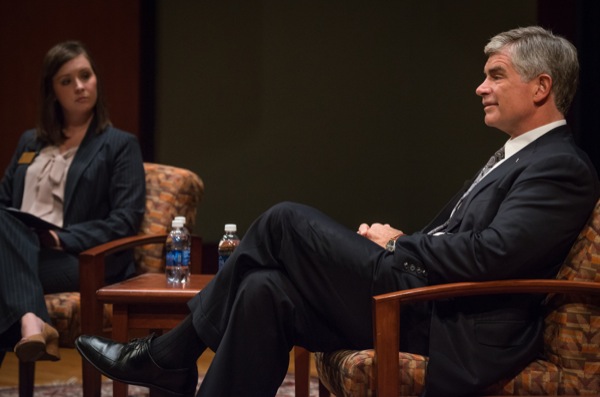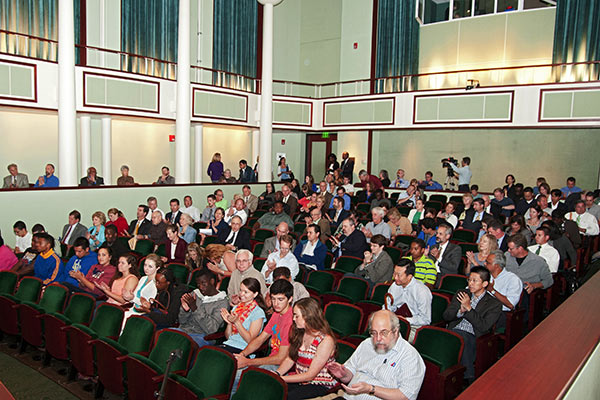Making sense of higher education's future
UD President Harker says it's not 'business as usual' in face of change
Editor's note: To watch a video of this presentation, click here.
7:03 p.m., Oct. 1, 2014--Universities are facing significant, fundamental change driven by such pressing issues as rising cost to questions about whether students are being adequately prepared for the workforce, and success will go to those willing to take risks, according to Patrick Harker, president of the University of Delaware.
“It’s not business as usual,” Harker told an audience of about 200 on Monday, Sept. 29, as the first presenter in UD’s Thought Leader Speaker Series, held in the Roselle Center for the Arts.
Campus Stories
From graduates, faculty
Doctoral hooding
Harker’s formal remarks on “Making Sense of Higher Education’s Future” were followed by a question-and-answer session moderated by Emily Bonistall Postel, program coordinator for the Office of Equity and Inclusion and a doctoral student in sociology at UD.
The University of Delaware has lots of good things going for it, Harker said. He pointed out that this fall’s freshman class of over 4,200 students is the second largest in UD’s history.
Additionally, UD is becoming more diverse, with 26 percent of the student population from underrepresented groups. The scholarship of the faculty also continues apace, with research funding averaging $170,000 per faculty member, up 38 percent since fiscal year 2008.
“Things feel pretty good here, so why are we talking about challenges? Why are we worried?” Harker asked.
Harker noted that although U.S. research universities are conducting more and more of the nation’s fundamental and applied research, higher education increasingly is being viewed as out of touch and unaffordable. The average college debt of public college graduates with loans today is a staggering $25,550.
With government support flat and declining, and endowments taking a hit, universities have had no alternative but to raise tuition. That increase, in turn, put the squeeze on American families.
“We are the critical rung for the American middle class,” Harker said.
Higher education as an opportunity
Not surprisingly, venture capitalists see higher education as an opportunity.
“If somebody can do this cheaper and as well as we can, then we’re in trouble,” Harker said.
What universities are set up to do is to be “efficient, effective teaching machines,” which is fine, Harker said, if teaching equates with learning.
Books like the Second Machine Age warn us that the robots are coming, and technology may soon supplant jobs ranging from taxi cab drivers to lawyers in certain fields.
But what machines can’t do, Harker said, are the three areas where universities should shine: ideation—new, creative thinking; large frame pattern recognition, considering the scientific, cultural and artistic effects; and complex communication, in terms of writing, reading, negotiation and persuasion.
Figuring out how universities can thrive as learning leaders in the 21st century requires getting people out of traditional modes of thinking and testing new ideas and approaches.
“We are a community used to experimentation,” Harker said. “We do this all the time—we set up experiments, we analyze, we can set up SkunkBoards to explore new alternatives. I think this is critical for higher ed now.”
Harker focused on “student-centric learning” and the need to integrate classroom education with student internships and externships. He spoke about changing the mindset of teaching classes in one place and then “we go over there and do that other stuff.”
“The University is a leader in problem-based learning,” Harker said. “Don’t rest on that, but how do we take a quantum leap in the quality of education while keeping costs down? I think we can lead in this state, but also in this nation,” Harker said.
Questions and answers
During the Q&A session, the University’s General Education requirement, which is currently being reexamined, online education, balancing education with job training, and diversity and inclusion were among the topics addressed.
Postel asked Harker what the University can do to ensure that the campus is an inclusive place, given the changing demographics of the student population in regard to minority, low-income and first-generation students at UD.
Harker pointed out “a couple of big things and lots of little ones,” ranging from ensuring that the campus is a safe environment with all the right policies and procedures in place, to students welcoming the new student in the dorm, and faculty ensuring that everybody participates in class.
“It’s everybody’s efforts,” Harker said. “It’s personal interactions—make sure those are positive.”
The Thought Leader Speaker Series, which is sponsored by the University’s Delaware Will Shine strategic planning initiative, is designed to inspire discussion about issues and opportunities facing higher education.
The next presentation in the series will feature Richard Tapia, director of the Center for Excellence and Equity in Education at Rice University, who will speak on “The Diversity Crisis in Higher Education: The Need for New Understanding and Leadership” on Monday, Oct. 13, from 4 to 5 p.m. in Gore Recital Hall, Roselle Center for the Arts.
For more information about UD’s strategic planning initiative and to share thoughts about the UD of the future, visit the Delaware Will Shine website. Nominations for Thought Leader speakers continue to be accepted on this webpage.
Article by Tracey Bryant
Photos by Kathy F. Atkinson and Fan Wenbo













